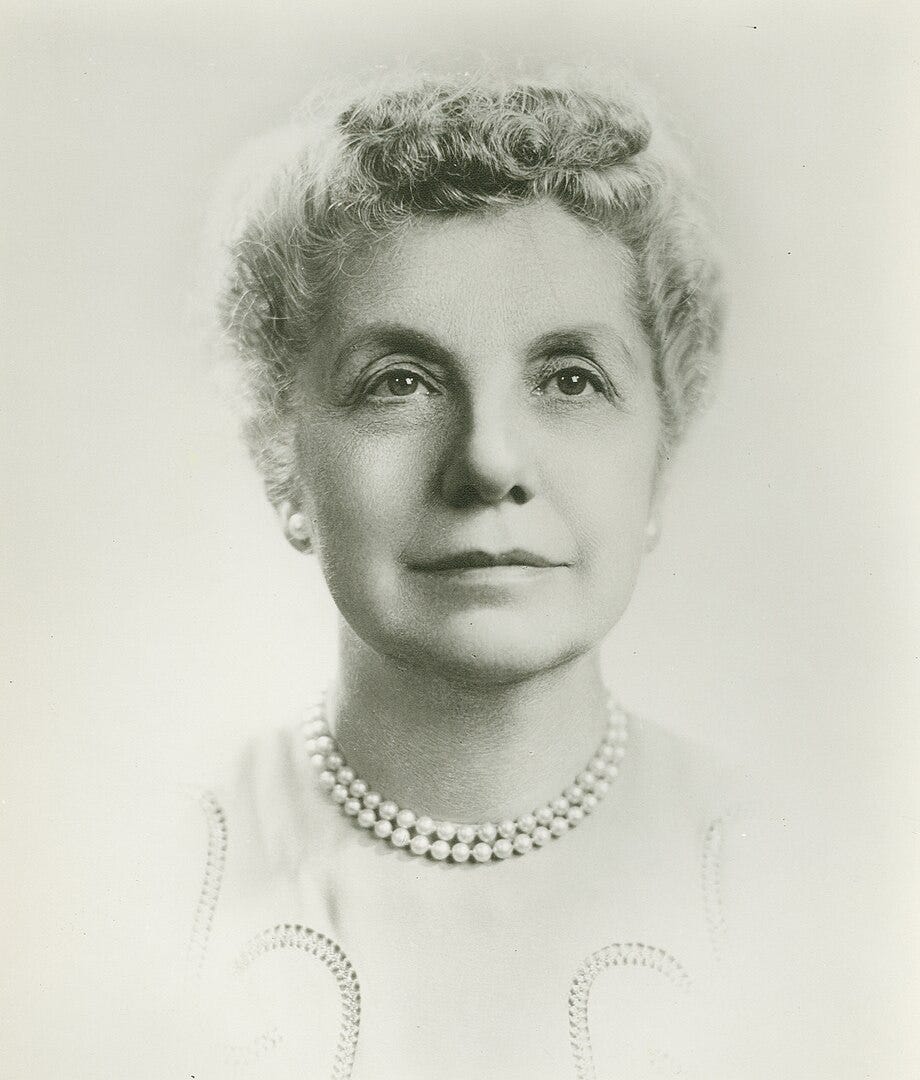A Model for Modern-Day Republicans
The late U.S. Rep. Marguerite Stitt Church (R-IL), a conservative Republican, eschewed bombast and established herself as an independent political force who reached across the aisle to get shit done.
As a lifelong Democrat and co-author of Politics, Partnerships & Power: The Lives of Ralph E. and Marguerite Stitt Church, I didn’t expect to find myself admiring a conservative Republican. But Marguerite Stitt Church wasn’t like the Republicans we often see dominating headlines today.
She didn’t follow anyone blindly.
She didn’t grandstand or pander.
She led—with quiet strength, deep conviction, and unwavering grace.
During her 12 years in Congress, from 1951 thru 1963, she led with a deep sense of duty—
not to a party, but to the people she served.

In Chapter 12 of my book, Marguerite emerges as a principled disruptor in Congress—subtle yet steadfast. Initially stepping into her late husband’s seat, she quickly proved she wasn’t a placeholder. Her convictions were her own, and her voice, though measured, carried weight. While she held firm to conservative ideals, particularly fiscal restraint, she never hesitated to challenge her own party when it veered off course.
…she never hesitated to challenge her own party when it veered off course.
Marguerite was no isolationist. She believed in internationalism long before it was popular on the right. She also took the time to understand the complexities of foreign aid, evolving from early skepticism to a more informed and nuanced perspective through firsthand experience. On global study missions—often dismissed as “junkets”—she traveled to Korea, Africa, Afghanistan, and beyond, evaluating aid programs and exposing waste and corruption. Her takeaway? American dollars meant nothing without local accountability or cultural understanding.
And though she faced blatant sexism—both in Congress and abroad—she refused to back down. When denied access to a royal throne room because of her gender, she went in anyway. She demanded respect, not for herself, but for the office she held and the people she represented.
“She ducked when shots rang out in the House chamber, then calmly called her daughter to say she was okay. That’s who she was.”
Marguerite was guided by her Christian faith, but she didn’t impose it. She spoke openly about her beliefs, but she didn’t weaponize them. She welcomed all her constituents, often literally to her front porch in Evanston, Illinois—an approach that stands in stark contrast to today’s town hall–dodging representatives.
Though some votes were complicated—supporting civil rights provisions while opposing the broader bills they were attached to—her record on racial justice was consistent and largely praised. She supported voting rights. She introduced legislation to combat gender discrimination in federal hiring. She led by example in a world not built for women like her.
Marguerite also had the courage to challenge American hypocrisy abroad. She publicly questioned former Secretary of State Dean Acheson on the U.S.’s double standard: condemning aggression by adversaries while excusing it in allies. It wasn’t about political posturing—it was about living up to the ideals she believed America stood for.
A Legacy of Quiet Power
Throughout the 1950s and early ’60s, Marguerite remained one of the most respected members of Congress—not because of legislative flash, but because of her unrelenting integrity. She won re-election again and again, even as her district grew more liberal, because her constituents trusted her.
She rejected negative campaigning.
She stayed focused on the work.
She earned votes by showing up, listening, and doing her job.
“She personally greeted restaurant workers, turned her Evanston home into an office, and flew home nearly every weekend from Washington.”
And she surprised many near the end of her career. She supported U.S. funding for a United Nations peacekeeping mission in the Congo—even as other conservatives pushed back. She accepted President Kennedy’s invitation to serve as a UN delegate during a history-making year with the largest number of women ever appointed. And perhaps most notably, she’s credited for championing the initial funding of the Peace Corps—giving a passionate speech that reportedly swayed the vote.
By late 1961, as her Illinois district began to shift and her own priorities evolved, Marguerite announced her retirement from Congress. True to form, the decision came during a quiet moment of reflection—not in front of cameras, but while walking near the United Nations headquarters in New York. She described feeling a profound sense of peace and clarity, realizing it was time to step aside. “I’ve never regretted it,” she later said. She believed public servants should leave while they still had energy and curiosity for life beyond politics.
She believed public servants should leave while they still had energy and curiosity for life beyond politics.
Her final months in office were anything but slow. She took on a Latin American tour to assess Peace Corps operations for the Alliance for Progress, continuing to evaluate U.S. foreign aid programs with the same diligence that had defined her career. During that trip, a car accident in Guatemala left her with a broken leg and fractured ribs. Still, she returned home smiling, wheeled into her farewell testimonial dinner with typical humor: “Foreign aid got a lusty kick after all,” she joked.
Tributes poured in from both sides of the aisle. Former President Eisenhower called her “a valuable asset to the Republican Party.” Madame Chiang Kai-Shek praised her lifelong commitment to Christian values. And a young Donald Rumsfeld, who succeeded her seat, recalled her grace, generosity, and even how she personally drove his wife to Washington when the couple was just starting out.
After leaving Congress, Marguerite remained deeply involved in civic life—supporting causes like the U.S. Capitol Historical Society (which she helped found), staying active in Republican politics, and continuing to advocate for women’s leadership. Even after personal losses, including the deaths of her sister Edna and her grandson Todd, she carried on with quiet dignity, encouraging civic engagement and service, especially among women.
She carried on with quiet dignity, encouraging civic engagement and service, especially among women.
She lived to 97, passing away in 1990. And while her name may not be instantly recognizable today, her legacy looms large for those who value integrity in public service.
Marguerite Stitt Church showed us that principled conservatism isn’t about obstruction or outrage—it’s about restraint, respect, and reasoned conviction. She was a believer in American democracy—not just as a system, but as a moral responsibility.
In today’s political landscape, where the loudest voices often drown out the wisest ones, we would do well to revisit her story.
Though Marguerite’s heart was guided by her faith, she didn’t succumb to fanaticism. She upheld her values without dehumanizing those who disagreed. She didn’t stoke fear or cling to power—she served with humility, and she stepped aside with grace.
We need more public servants like her.
And yes, as a Democrat, I wish more Republicans followed her lead.

To learn more about Marguerite’s extraordinary life, you can find her full story in Politics, Partnerships & Power: The Lives of Ralph E. and Marguerite Stitt Church, co-authored by Jay Pridmore and me.

Your Turn
What does principled leadership mean to you? Would you vote for a Marguerite Stitt Church today?
Know someone who needs to read this? Feel free to forward or share.
If you're not yet subscribed to this newsletter, hit that button below and join the conversation.




A great model indeed I always enjoy hearing about her.